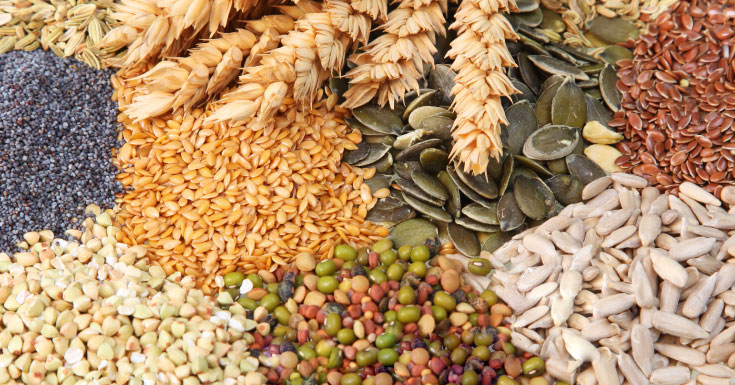Not everyone looks at seeds as healthy, powerful, health-enhancing food, and their tiny size probably has loads to do with it. As small and unassuming as they are, seeds are rich in nutrients and can have tremendous health benefits. They are tasty, easy to obtain and are exceptionally versatile too. According to which seed you’re using, you can bake with them, toss some into your salads, add them in your smoothie, or just snack on them.
There are many, many ways we can add seeds into our diet.In fact, chances are, you are already consuming them in some ways already, without realising it! Seeds can also be in food products such as tahini (sesame seeds), or trail mix, granola bars, breakfast cereals, etc, which may contain multiple kinds of seeds as part of their ingredients. Some seeds, such as flaxseeds, are also milled into flour to be made into delicious breads and other baked goods.
Just think about it! Seeds represent the very beginning of a plant’s life, and they contain nutritious oils that sustain a plant’s life during its early stages. Even kings of the past revere them as nutritious food, encouraging their subjects to eat them to thrive.
Are you ready to add the mighty goodness of seeds into your diet? Let’s get to know about them first!
Chia seeds
Believe it or not, chia seeds are actually related to the mint plant! They are traced as far back as the Aztecs, and they were also an integral part of the Mayan’s diet. Although it seems widely popular today in the health food scene, the chia seed is historically known, with its own ancient background. They’re loaded with fiber, protein, omega-3 fatty acids and various micronutrients, and, get this: most of their carbohydrates are fibres!
Nutrition fact: 28 grams of Chia seeds contain:
- Fiber: 11 grams.
- Protein: 4 grams.
- Fat: 9 grams (5 of which are omega-3s).
- Calcium: 18% of the RDI.
- Manganese: 30% of the RDI.
- Magnesium: 30% of the RDI.
- Phosphorus: 27% of the RDI.
Pomegranate seeds
We don’t blame you if you didn’t think that this would show up in our list of healthy seeds! As a matter of fact, pomegranate seeds are among the most nutritionally dense foods there is. In each pomegranate fruit, there are hundreds of edible seeds waiting to be consumed. Each of these seeds are coated by a sweet covering called aril. Both the seed and its aril are edible. Pomegranates are rich in fiber, vitamins, minerals and bioactive plant compounds that our bodies need to thrive. Eat them raw, toss them into your salad, or make a refreshing juice or smoothie with a handful of pomegranate seeds, and sow their benefits, daily!
Nutrition fact: 174 grams of pomegranate seeds contain:
- Fiber: 7 grams
- Protein: 3 grams
- Vitamin C: 30% of the RDI
- Vitamin K: 36% of the RDI
- Folate: 16% of the RDI
- Potassium: 12% of the RDI
Sunflower seeds
Sunflower seeds are harvested from the plant’s large flower heads. Did you know that each flower head may yield up to 2,000 of these seeds? They are a great source of vitamin E and selenium, which act as antioxidants to protect your body’s cells against free radical damage. Sunflower seeds also contain beneficial plant compounds, including phenolic acids and flavonoids — more antioxidants!
Nutrition facts: 28 grams of sunflower seeds contain:
- Calories 100
- Calories from Fat 70
- Total Fat 7.4g
- Saturated Fat 0.8g
- Sodium 616mg
- Total Carbohydrates 3.7g
- Dietary Fiber 9g:
- Protein 3g:
Sesame seeds
If you love tahini, you don’t need any convincing to add these super-nutritious seeds into your daily diet. Sesame, or Sesamum indicum as it’s known scientifically, contains protein, fiber, healthy fats, calcium, B vitamins, vitamin E, and antioxidants. These tiny seeds have a distinctive taste to them, and are a popular addition to many Asain dishes, including confinement meals.
Nutrition facts: 28 grams of sesame seeds contain:
- Calories: 160.
- Fiber: 3.3 grams.
- Protein: 5 grams.
- Magnesium: 25% of the RDI
- Calcium: 22% of the RDI
Flaxseed
Also known as linseed, flaxseed has been cultivated and grown from the early days of civilization. It was said that during his time, Charles the Great encouraged his people to consume this seed for their good health. Flaxseeds are rich in heart-healthy omega-3 fats, fiber, and other unique plant compounds . They are said to contribute to better digestive health, as well as a reduced risk of common diseases such as heart disease, type 2 diabetes, and perhaps even cancer.
Each 10 grams serving of flaxseeds contain:
- Calories: 55
- Water: 7%
- Protein: 1.9 grams
- Carbs: 3 grams
- Sugar: 0.2 grams
- Fiber: 2.8 grams
- Fat: 4.3 grams
Watermelon seeds
Did you know that one of our favourite TV snacks, the kuaci, turns out to be a powerhouse of nutrients, and they also help to boost your metabolism? Yes, the humble watermelon seeds are exceptionally rich in important nutrients such as folate, iron, zinc, copper, magnesium, potassium. They are also an exceptionally good source of amino acids, proteins and vitamin B complex.
Watermelon seeds per 4 grams contain:
- Calories 23
- Magnesium 21mg
- Iron 0.29mg
- Monounsaturated fatty acids:0.3 grams
- Polyunsaturated fatty acids:1.1 grams
















